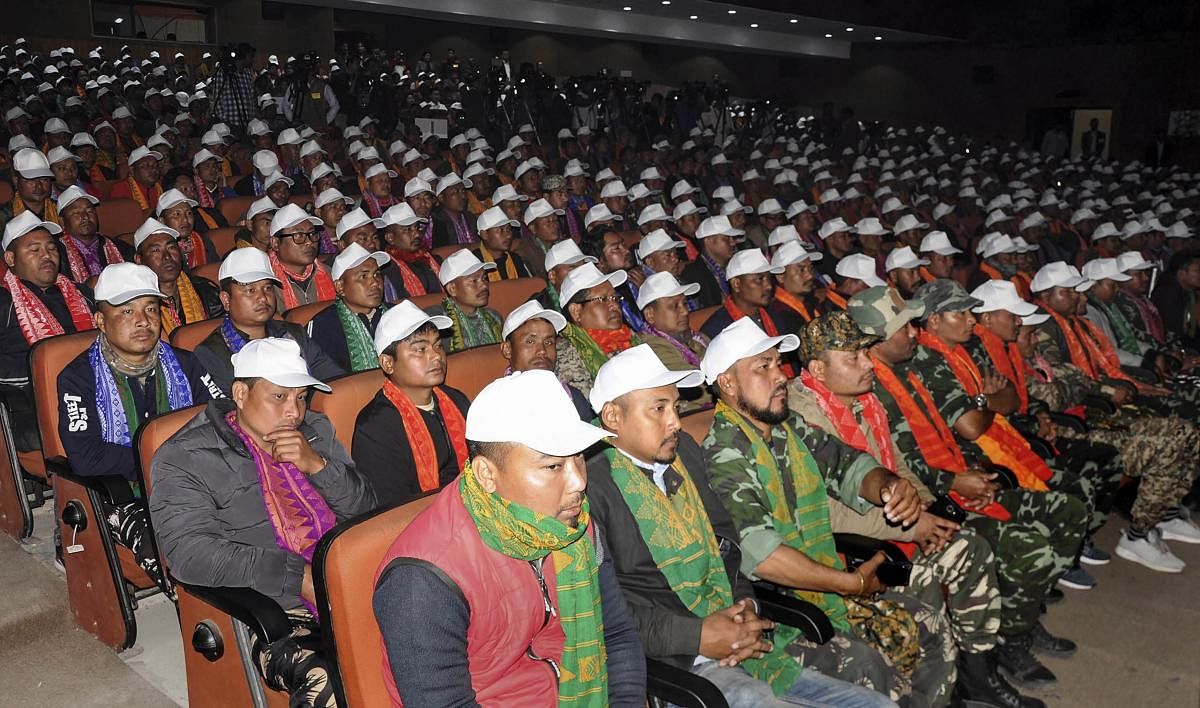
Three factions of NDFB, a rebel group in Assam, which carried out an armed fight demanding a "sovereign Bodoland" since 1986 were disbanded on Monday, weeks after signing a "comprehensive agreement" with the Centre.
NDFB (Ranjan), NDFB (D) and NDFB (S) were formally disbanded at a function organised in a designation camp at Sonai in Udalguri district. Another faction, NDFB (P) led by Gobindo Basumatary is also likely to be disbanded in Kokrajhar on Tuesday.
"Since the memorandum of settlement was signed on January 27, 2020, and subsequently the arms struggle came to an end, we resolve to denounce ourselves, the NDFB organization with a view to shun violence and to give peace a chance,” a declaration signed by leaders of the three NDFB factions said.
NDFB was formed in October 1986 with a demand for a sovereign state for the Bodos, the second biggest community in Assam. More than 4,000 people including security forces, civilians and militants died in the violent years that followed and in the counter-insurgency operations by the security forces. A ceasefire was signed in 2005 to end the violence but the faction led by Ranjan Daimary did not accept it and continued the "armed movement." The outfit leaders including Daimary were convicted in the 2008 serial bomb blast cases in which nearly 100 died and another 500 injured. Daimary is undergoing life imprisonment in Guwahati central jail.
NDFB (Ranjan) declared a ceasefire and later engaged in peace talks after Daimary was arrested in Bangladesh and handed over to India in 2010. NDFB (Saoraigwra), which later broke away, however, continued the attacks including the massacre of 84 Adivasis in December 2014. The Centre launched a crackdown against it after the massacre in which 60 cadres were killed and over 500 arrested.
The NDFB (S), however, came overground from their hideouts in Myanmar in January and signed the new agreement with three other factions and the influential All Bodo Students' Union (ABSU) on January 27 this year to end the long conflict. The agreement decided to redraw the present Bodoland Territorial Area Districts under the Bodoland Territorial Council (BTC) and rename it as the Bodoland Territorial Region. It also announced a financial package of Rs. 1,500 crore to take up various welfare projects in education, healthcare, industrial and cultural development and jobs creation in the BTR in the next three years. Assam government also decided to accord associate official language status to Bodo language and rehabilitate 1,615 cadres of the four factions, who had laid down their arms on January 30 here.
Political plunge:
Gobindo Basumatary recently joined United People's Party Liberal (UPPL), a small party while leaders of the three factions on Monday announced that they would also join active politics soon to "properly implement" the new agreement signed with the Centre. UPPL will contest the next BTC elections with the support of ABSU but three others are likely to join Bodoland People's Front (BPF) led by Hagrama Mohilary. BPF, an ally of the BJP-led Assam government since 2016 has been ruling the BTC since its formation in 2003.